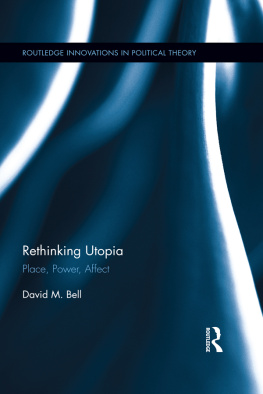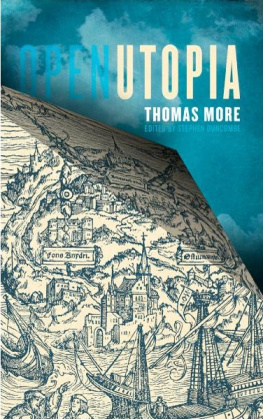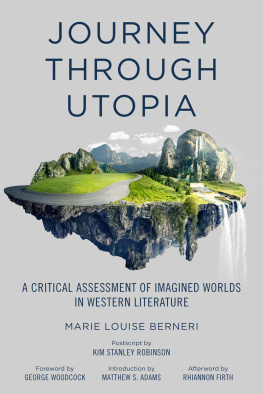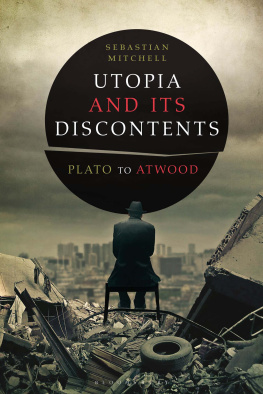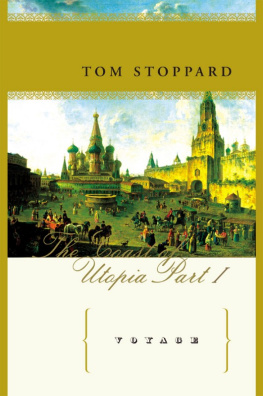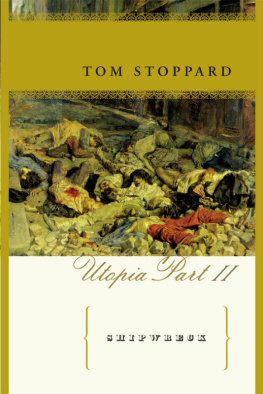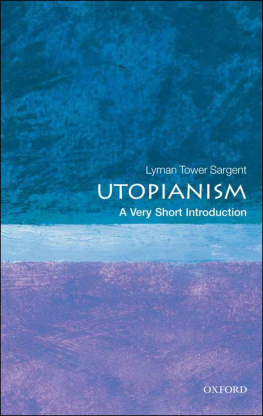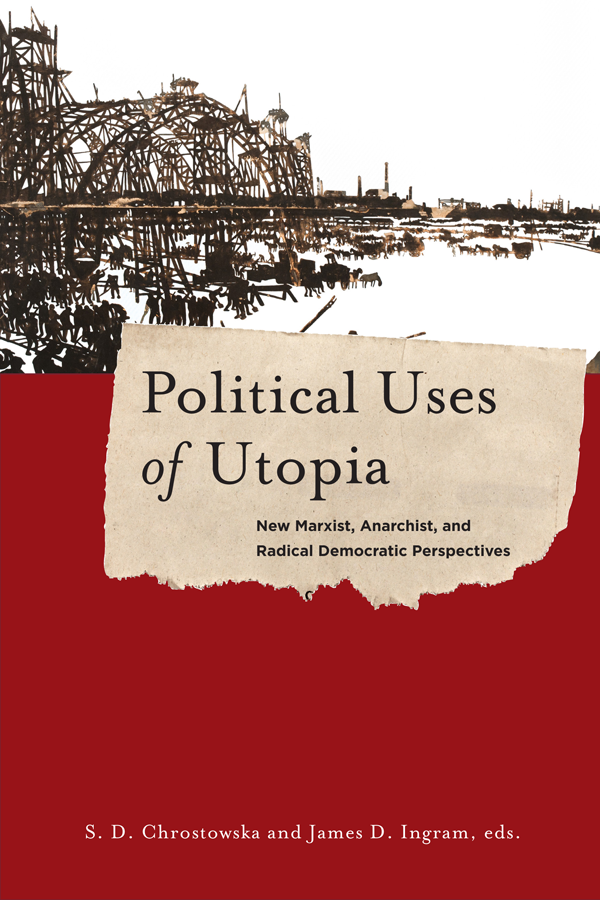Contents
Guide
Pagebreaks of the print version
POLITICAL USES OF UTOPIA
NEW DIRECTIONS IN CRITICAL THEORY
Amy Allen, General Editor
New Directions in Critical Theory presents outstanding classic and contemporary texts in the tradition of critical social theory, broadly construed. The series aims to renew and advance the program of critical social theory, with a particular focus on theorizing contemporary struggles around gender, race, sexuality, class, and globalization and their complex interconnections.
POLITICAL USES OF UTOPIA
NEW MARXIST, ANARCHIST, AND RADICAL DEMOCRATIC PERSPECTIVES
EDITED BY S. D. CHROSTOWSKA AND JAMES D. INGRAM
Columbia University Press
New York

Columbia University Press
Publishers Since 1893
New York Chichester, West Sussex
cup.columbia.edu
Copyright 2016 Columbia University Press
All rights reserved
E-ISBN 978-0-231-54431-3
Library of Congress Cataloging-in-Publication Data
Names: Chrostowska, S. D. (Sylwia Dominika), 1975- editor. | Ingram, James D., 1972- editor.
Title: Political uses of Utopia / edited by S.D. Chrostowska and James D. Ingram.
Description: New York : Columbia University Press, [2016] | Series: New directions in critical theory | Includes bibliographical references and index.
Identifiers: LCCN 2016041212| ISBN 9780231179584 (cloth : acid-free paper) | ISBN 9780231179591 (pbk. : acid-free paper)
Subjects: LCSH: UtopiasPolitical aspects. | Political sciencePhilosophy.
Classification: LCC HX806 .P64 2016 | DDC 321/.07dc23
LC record available at https://lccn.loc.gov/2016041212
A Columbia University Press E-book.
CUP would be pleased to hear about your reading experience with this e-book at .
Cover design: Rebecca Lown
CONTENTS
James D. Ingram
MIGUEL ABENSOUR
RICHARD SAAGE
FRANCISCO FERNNDEZ BUEY
FRANCK FISCHBACH
PETER HALLWARD
TIENNE BALIBAR
JOHN GRANT
MICHLE RIOT-SARCEY
MICHAL LWY
RUTH KINNA
JACQUES RANCIRE
RAYMOND GEUSS
TIENNE TASSIN
S. D. CHROSTOWSKA
JAMES D. INGRAM
U topia, we might think, is nothing if not political. Its best-known examples, from Plato via More, Campanella, and Bacon to Owen, Morris, and Bellamy, present cities, the political form of life par excellence, organized to remedy the defects their authors perceived in their own. To this extent they offer up political solutions to political problems. At the same time, however, utopias are forever being criticized for seeking to escape or eliminate politics, and not without reason. For if utopias present solutions to political problems, by building the common good into the design of the worlds they depict, they do away with the need to contest it. Such contestation of the common goodalong with its less high-minded correlates, like fighting for power, advantage, recognition, and resourcesis precisely what makes up what is ordinarily regarded as politics. Ergo, utopias are inherently antipolitical. We may want to object that the fact that the cities described in utopias tend to do away with politics is not to say that the genre or activity of inventing or reflecting on them does. As interventions into public life, as literary or theoretical acts, utopias are political through and through, written to raise political questions and even to advance political causes, even if the worlds they depict belie this by presenting imagined answers to these very questions.
In view of this tangled intimacy, it may seem odd that the question of utopias relationship to politics and political thought should have been mostly absent from the revival of utopian studies in recent decades. As no less an authority than Lyman Tower Sargenta pioneer in the field, one of its leading figures for over half a century, and a political theorist by training and professionput it in a short introduction to utopianism in 2010: At the time of writing, there is no general study of the role utopianism plays in political theory. What is striking about this earlier list in light of the authors much later diagnosis is what it omits: politics itself, be it in the mode of action or reflection, practice or theory. Whether we understand it as an activity or a domain, in terms of unity or plurality, solidarity or conflict, harmony or strife, politics per se does not make it inhidden, as it were, behind three faces that approach it without ever coinciding with it. The province of politics, it seems, is somehow absent from the map of utopia.
The same missed encounter can be observed from the other side in the sense that, just as utopianism has kept a distance from politics and political theory, political theory has had little time for utopia over most of the last three generations. To be sure, Sir Thomas Mores classic remained on reading lists and references to the general idea of utopia continued to figure in historical as well as normative political theory. Yet, in ways and for reasons I discuss below, in the postwar period the standing of utopia and utopianism within Anglophone political theory fell to its modern nadir. Where utopia was not attacked, it was dismissed; where it was not dismissed, it was ignored; where it was not ignored, it was taken up in forms so impoverished as to suggest not only that nothing had been learned from the long history of utopian reflection, but that much had been forgotten. For most political theory in English, the problem has been less an absolute ignorance of utopianism than a failure to think seriously about how it might inform politics and political thought. A burning question in the nineteenth, eighteenth, and even sixteenth centuries, utopia, along with the sophisticated strategies developed for negotiating it, became a label signifying that something did not bear serious consideration, and was thus lost to political reflection.
How might we understand this disjuncture between utopia and politics, or between utopianism and political theory? In part, utopias estrangement from politics and political thinking can be understood as an effect of the critical and imaginative distance utopias always take from the status quo, not infrequently cited as one of utopias raisons dtre; it is only possible to find or construct a utopia, in words or in bricks and mortar, at a remove from the world we live in. But the gap between politics and utopia is also a product of recent political-intellectual history, of the trajectory of politics and political theory, especially in English-speaking countries, over the last five or six decades. Nothing shows the contingency of this trajectory more clearly than the fact that things evolved quite differently elsewhere. Indeed, the idea of utopia denotes and connotes different things not only in different fields but also in different national and linguistic contexts. Even more significant than the cultural-geographical peculiarity of the factors that drove utopia and politics apart in English-language political theory, moreover, is their boundedness in time, which ties them to a moment that combined the recent experience of totalitarianism with a world organized by the Cold War.
The intuition behind the present book is that times have changed, and that, as I will argue in this introduction, circumstances that recommended wariness concerning utopia have given way to those that favor giving it a new look. These new circumstances are both political and theoretical. On the political side, in recent years, partly in response to various crises (financial and economic, but also political, ecological, and the like) and the manifest inadequacy of political responses to them, activists and ordinary citizens have increasingly expressed a desire for fundamental changes to society beyond what existing political institutions and even imaginations seem to be capable of. Conditions that formerly allowed antiutopians to insist that dreams of a perfect world are inherently dangerous have given way to ones in which a leading activist mantra is that another world is possiblea utopian claim, no doubt, but a strikingly modest one. At the same time, developments internal to utopian social and political thought have largely addressed the features of utopianism that led earlier political thinkers to reject it. Some of these innovations are relatively recent; others arise from new approaches to the history of utopianism, which have uncovered new perspectives on older sources. Both present political circumstances and theoretical developments within utopian studies, then, present an opportunity to rethink the politics of utopia on new bases.


